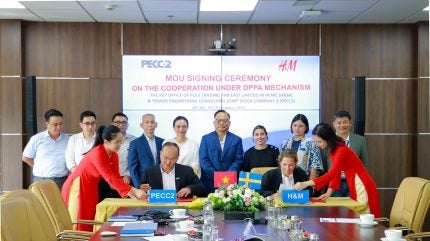
This agreement, signed on 19 November 2024, makes H&M the first global fashion brand to sign deal under the government policy for green energy. It also represents a significant advancement in the company’s efforts toward achieving its sustainability objectives.
The partnership enables H&M to procure clean energy at competitive rates.
The signing event occurred at the PECC2 Innovation Hub and featured participation from key figures, including H&M regional country manager Jessica Vilhelmsson and PECC2 chief operating officer Nguyen Hai Phu, along with representatives from both organisations.
During the ceremony, H&M’s team was given a tour of various facilities within the PECC2 Innovation Hub. They visited the Battery Energy Storage System (BESS), the Operations Control Center (PECC2-OCC), and the Digital Capability Center (PECC2-DCC).
This visit provided insights into how technology is used for remote management of power plants and the digitisation processes involved in power plant projects.
Further, this agreement signifies a key moment for PECC2, as it focuses on facilitating a transition to clean energy through the development of renewable energy projects aimed at supplying sustainable electricity to major corporations like H&M via the DPPA framework.
The Vietnamese energy company aims to create opportunities for clients in the renewable energy landscape and commits to delivering value while ensuring mutual benefits for all stakeholders involved.
The DPPA mechanism, approved by the Vietnamese Government in July this year, allows private renewable energy developers to sell electricity directly to consumers. The policy marks a key advancement toward achieving net-zero emissions by 2050.
Backed by both domestic and international private sector entities and investors, the DPPA outlines mechanisms for large energy consumers to acquire clean energy supplies directly. This initiative is expected to stimulate increased investment from the private sector and contribute to economic growth by aligning corporate emission reduction goals with Vietnam’s clean energy objectives.
It allows large electricity consumers with a connection voltage of 22kW or above and an average monthly usage of 200,000kWh to source renewable energy directly from producers, bypassing the state-owned power buyer, EVN.



